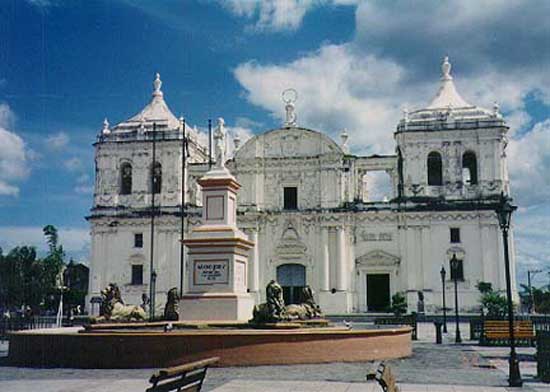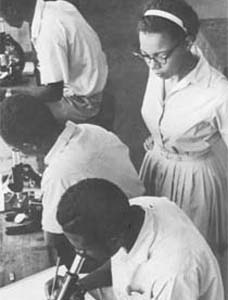
Nicaragua RPCV Joshua Berman writes "On this Bus"
On This Bus
By Joshua Berman '95
[ALUMNI POV]
Finally
(Josh Goshfield)
IIt was a good bus day. As the old, dirty, yellow school bus sped north toward the Nicaraguan hills, it was not too crowded, not too hot, and no live chickens were being dangled in front of my face. The seats were all filled, and although a few people stood casually in the aisles, no one was crammed in as they are on busier days. A family feeling prevailed on this tranquilo Sunday ride. I sat up against the window, and a beautiful girl, about eight years old, slept against my other shoulder. She leaned against me as if we were siblings. Across the aisle, her large, laughing mother sat with a group of other children and talked easily with a friend in the seat behind her. The bus today was like a long, windy living room.
I was heading toward my current home, nearing the end of a twenty-four- hour fast. Yom Kippur was a few days away. I've never been crazy about the whole atonement side of this holy day, but I like the focus on reflecting over the past year - especially when it has been one of the most intense, most unpredictable, and richest years of my life.
Outside, the flat valley with its rice fields was bright emerald green, and the late afternoon air was refreshing as it blew in through the bus windows - a cool, rainy-season afternoon in Central America. I sat forward to get more of the breeze on my face, and as I did, I again felt the knotting in my stomach. Hunger pains, I noted - very different from parasite-induced intestinal cramps. As I knew from experience, hunger comes from farther away and doesn't feel as urgent.
I've been living in the Estel region of northern Nicaragua for nearly two years. I have tried to adapt to Nicaraguan culture. I've learned a new language. I've witnessed the violence and destruction of a major natural disaster, and I've lived among widespread and constant poverty. I've been sick and healthy, and I've made it through a wild, romantic adventure. I know that I am a changed person, and fasting and reflecting while riding on the bus, I was trying to understand in what ways.
How, I thought, do you sum up a year? I made a list in my head of all the measurable things: The number of hours spent on buses, the time standing on the side of the road, waiting for some unknown ride to take me somewhere new. The number of cold Victoria beers consumed, the number of songs played on my guitar, the number of classes taught. The number of letters written, books read, trips taken to the latrine, tortillas eaten, and steps danced. All impressive data, to be sure, but I doubted if any of it would really explain the year as it was.
The little girl leaning against my shoulder shifted in her sleep, trying to get comfortable. Her mother looked over and smiled. I smiled back. In the States, I thought, this woman would have woken her kid and either awkwardly apol-ogized to me or angrily accused me of something. Here though, on this bus, we were all friends, all family. Mam turned away and continued gossiping with her girlfriend, hands waving and voice rising and falling in the typical Nicaraguan country camp-esina cadence. I brushed the girl's soft hair away from her eyes and admired its brown-blackness in the same way I had been enjoying the color of the rice fields. What had her year been like? I thought. How would she measure it? Had she felt this pit of hunger in her stomach? How strange that I had willingly chosen to experience hunger in such a hungry land.
At that moment the girl moved again and awoke. She looked up at me, eyes black and shiny, neither scared nor surprised by my bearded face. "Como se llama?" she asked me.
"Josué," I said.
Satisfied with my answer, she closed her eyes again and fell asleep.
I looked back out the window and breathed the fresh wind. The bus roared north into the head of the valley, nearing my pueblo and the end of my ride. This fast would soon be broken, and a new year of changes and experiences would begin. Glancing at the life around me, it was hard to imagine that this bus would ever stop rolling.
Joshua Berman is finishing a twenty-seven-month Peace Corps tour in La Trinidad, Nicaragua.











